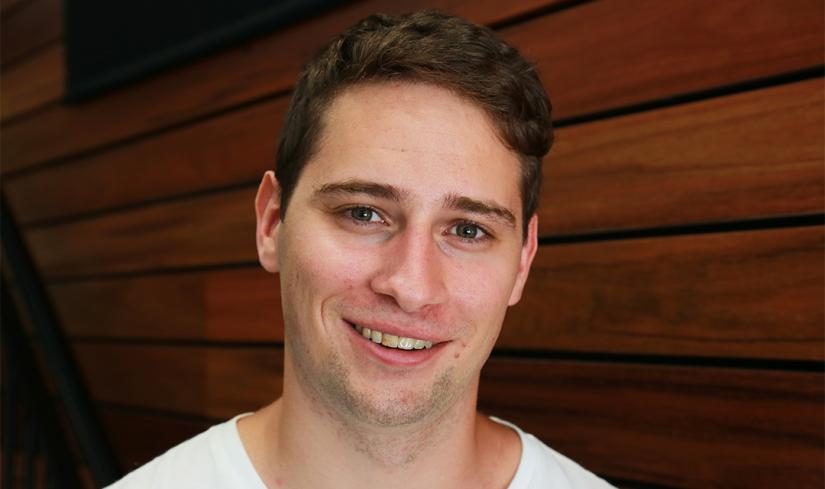UTS startup Compass IoT will join emerging Australian innovators and startup founders in a scholarship-supported pitching and networking event at the forthcoming Creative Innovation 2019 (Ci2019) Asia Pacific summit in Melbourne.

Compass IoT Founder and Director Angus McDonald. Photo by Liam Kennedy.
The startup is one of nine winners of Ci2019 scholarships valued at $10,000 and will attend the innovation conference in April alongside key international industry leaders and innovators.
Founder and Director Angus McDonald will be representing his team at the summit, where the theme of human and artificial intelligence will make it an ideal forum for showcasing the Compass IoT platform, which is designed to optimise transport networks by predicting and preventing problems.
“We’re a data integrator. We take data about how a transport operation works and we use machine learning on top of that to carry out anomaly prediction and event prediction,” Angus explains.
The program tracks data on public and private modes of transport, mapping journeys to help city and transport planners identify bottlenecks and hazards, and then develop solutions.
“We’ve got two points of data: the start and end of a trip for an individual, and we’re using machine learning to predict routes. You’ll see the program match a trip to a route, and then we can say: ‘If they’re starting from point A, this is how many people are going to use a bus stop if you build one there’”.
Planning transport with precision
Within just six months, Angus and his team, including current and former UTS students from the Faculty of Design, Architecture and Building and the Faculty of Engineering and IT, have built the program to do the heavy lifting when it comes to complex data analytics in transport management.
“If you’re going to build infrastructure, a lot of money has to be spent on consulting, to see if there’s enough supply and demand on the transport network. We take out the guesswork,” he says.
“We use machine learning and data to give you an exact number of how many customers are going to want that system in that area. We also give network operators a real-time view of their operations so they can see when issues are happening in real-time.”
After months spent wrangling the “incredibly complex” technology with his team, Angus says he’s looking forward to getting Compass in front of potential customers at the Melbourne summit.
“People from different government departments, including our target clients, are going to be there and we get to pitch to them and show them how Compass works in real time.”

Compass IoT tracks transport journeys to make for more efficient civic planning.
Connecting with government clients
In pitching the idea to potential clients during the conference, Angus will be able to draw on the success Compass has already gained working with small state and territory governments.
As the sole representative from NSW among the scholarship winners, Angus believes the Creative Innovation summit could be the best chance to get the attention of lawmakers from his home state.
“Our clients are generally quite slow to adopt new things, so it’s always good to start the conversation early. As we proved the concept working with smaller organisations already, we should be able to get the bigger governments like New South Wales that have really complex transport networks.”
Those scholarship winners attending the conference, many of whom are emerging founders and entrepreneurs, will also get the chance to present a sixty second pitch to an audience gathered from across globe.
It will be this opportunity to pitch to an international audience, in addition to the myriad of potential networking connections, that Angus is looking forward to most.
“It’s all about networking and that’s where the value is for us. It’s always a good experience [to pitch]. Even when you pitch yourself, you learn a bit about your business every single time because you get different questions.”
Having grown in the UTS Startups program since joining late last year, Angus says the Compass team has benefited from the support of fellow community members.
“It’s great! There’s a whole bunch of resources, not just the office space and your tea coffee, but you actually have a really good group of people to work with and it’s a great community.”

